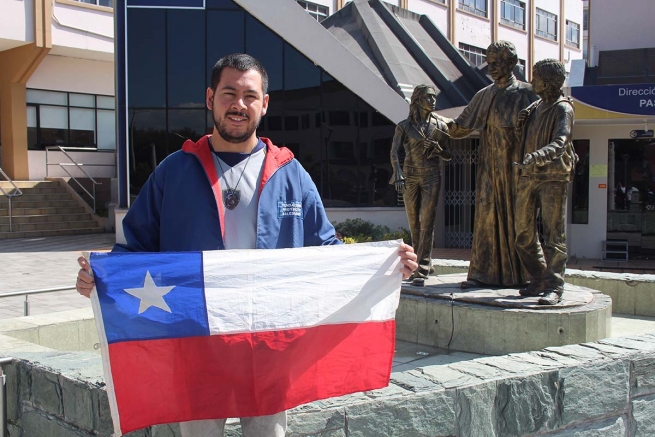ECUADOR: Salesian volunteer discovers his passion for working with at-risk youth while volunteering at Salesian program

(MissionNewswire) Gonzalo Peralta, a 26-year old from Chile, spent nine months as a volunteer missionary at Chicos de la Calle, a Salesian foundation located in Quito, Ecuador’s capital city. After volunteering, Peralta decided not to continue his post-graduate program in mathematics but rather enroll in a master’s degree program in psychology in order to continue his work with youth.
Peralta spent his time in Ecuador at the Mi Caleta reception center that is part of the Salesian foundation. He served as a professor of religion and mathematics and coordinator of the pastoral ministry of the Don Rua community as well as worked at the Salesian oratory on the weekends.
“Children who are at Mi Caleta that have been abandoned by their parents have marked my experience because it is hard to believe that there is such a hard reality,” says Peralta.
Some of his most cherished moments during his time volunteering was sharing the evening meal because each of the boys would tell him everything they had done during the day. In these conversations, it sometimes emerged that the boys knew they had done something wrong, but they were sure that they would stop doing it. This was their greatest motivation, Peralta noted, and it caused him to have great admiration for them.
The story that most struck him was that of a 12-year-old victim of physical, psychological and sexual abuse. His mother was a drug addict and his father died of drug abuse. The boy hasn’t given up and thanks to the reception center and the work of volunteers like Peralta, he continues to successfully study.
“One of the things that I carry in my heart is that a ball is enough to keep them entertained for the whole afternoon. They told me that with the ball, we forget all the pains,” says Peralta.
Salesian programs in Ecuador focus on education, social programs and workforce development to help the country’s most vulnerable citizens. Technical and vocational education is also provided to help youth gain the skills needed to find and retain long-term stable employment.
Ecuador’s poverty rate was 36.7 percent in 2007 and dropped to 22.9 percent in 2016. These results show that 1.4 million Ecuadorians escaped poverty within nine years. However, many Ecuadorians still live in impoverished conditions. Ecuador is one of the most inequitable societies in the world, according to UNICEF. The richest 20 percent of the population receives almost 50 percent of the national income, while the poorest 20 percent receives only 5 percent. According to the World Food Program, almost 26 percent of all children under age 5 have stunted growth, increasing to 31 percent in rural areas and 47 percent in indigenous communities.
Close to 20 percent of Ecuador’s population are people of indigenous heritage. For poor, rural and indigenous youth, education provides the best opportunity for finding employment, reducing inequities and breaking the cycle of poverty. Salesian missionaries have been providing education and other social programs for disadvantaged youth across Ecuador for more than 125 years.
###
Sources:
ANS Photo (usage permissions and guidelines must be requested from ANS)
UNICEF – Ecuador




